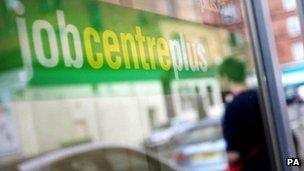Charities leaving Work Programme claim payments too low
- Published

Approximately 600,000 unemployed people are signed-up to the government's Work Programme
Some charities say they are pulling out of the government's Work Programme for the long-term jobless, claiming the payments received are inadequate.
The Single Homeless Project in London is the first to speak publicly about its decision to leave the £5bn scheme.
It says the upfront fees of up to £600 it receives do not cover the initial cost of helping long-term jobseekers.
DWP Minister Chris Grayling told the BBC it is charities' responsibility to agree contract terms they can deliver.
The Single Homeless Project (SHP) has told BBC Radio 4'sThe Reportthat it is withdrawing from the government's £5bn ($7.95bn) Work Programme saying that to continue is "not sustainable."
SHP chief executive Liz Rutherfoord said that the payments the charity receives are "not enough to meet the needs of the clients being referred to us."
'Not thought through'
SHP works with homeless people, helping them to access housing and welfare services as well as find employment.
"Most of them are not job-ready, or even in a position to be searching for work," says Ms Rutherfoord, "so the kind of intensive work we are doing with them, that money doesn't come anywhere near to covering it."
The Work Programme is being delivered by 18 prime contractors, each with a network of dozens of sub-contractors, many of which are from the voluntary sector - such as SHP.
The providers are primarily paid by results and the bulk of the fees they are entitled to are paid when they successfully find someone a job - and keep them in it.
Work Programme contractors are paid between £3,800 ($6,040) and £13,700 ($21,770) per person, depending on how difficult the client's personal circumstances are.
However, until a contractor reaches the position where one of their clients has successfully gained employment, they are only entitled to an upfront fee of between £400 and £600.
It is this upfront payment which charities like SHP claim is not enough to cover the cost of the initial work they do helping people apply for jobs and prepare for a return to work.
The idea behind having 18 large prime contractors to manage the programme is that they have the capital to take on the bulk of the financial risk until the bigger reward payments are paid.
However, a number of charities - the majority of which did not want to go on the record - have told the BBC that some prime contractors are simply passing down the same conditions to smaller contractors.
This is leaving voluntary organisations unable to fund the level of support they are offering to people most in need.
"I don't know that anybody has really thought about how you get the working capital into the hands of the people who understand the clients and can do the job," says Baroness Stedman-Scott, chief executive of the employment charity Tomorrow's People.
The Conservative peer, who has worked alongside the Work and Pensions Secretary Iain Duncan Smith, says Tomorrow's People entered into negotiations for 54 separate Work Programme sub-contracts, but only four were financially viable.
"The principle of the working capital transferring down has not materialised in the way we aspired it would," she told the BBC.
'Severe barriers'
One of SHP's clients is Dave - one of more than 600,000 long-term unemployed people currently on the Work Programme.

Dave was helped by Single Homeless Project and is currently seeking employment
He was sleeping rough when he was sent to SHP for help. "I had health issues and I had to stop working," he explains.
"By the end of it, I was out of work for so long that I found it hard to get back into it. I couldn't pay the rent and was just sofa surfing, and from there I had to go and live on the streets."
SHP gave him regular meals, found him somewhere to live, and gave him a thorough health check.
They then sent him on courses to boost his confidence and paid for passport photos so that he could get the identification that any employer would require. Dave is now confident he will find a job soon.
"You can't look for a job when you're sofa-surfing or sleeping rough - it's so hard. When I got sent here I was like 'wow', I felt really lucky. I actually got the help I needed."
Critics of the Work Programme say that without more money paid upfront charities like SHP - which have expertise in helping people with significant personal problems - will leave the programme and those furthest from the labour market will be abandoned.
"They've got severe barriers, and no matter how you try, the intervention and the support they need is costly, and as far as the Work Programme is concerned, there just does not seem to be the resources," says Baroness Stedman-Scott.
Responding to the exit of the Single Homeless Project from the Work Programme, employment minister Chris Grayling said:
"The deals that are done between sub-contractors and prime contractors are entirely down to them."
Asked whether the government should be doing more to ensure that prime providers do not pass on all the financial risk to smaller charities in their supply chain, the Minister told the BBC:
"It is certainly the case that some organisations have done deals which are not working for them but I can't be the person who does the deals for them.
"We have created an environment where we have given - particularly the voluntary sector sub-contractors - all the cards in their hand, but if they haven't used those cards, that is not something the government can do for them."
The Reportis oneBBC Radio 4Thursday, 28 March at 20:00 BST. Listen again via theRadio 4 websiteor download thepodcast.
- Published1 March 2012
- Published22 February 2012
- Published3 February 2012